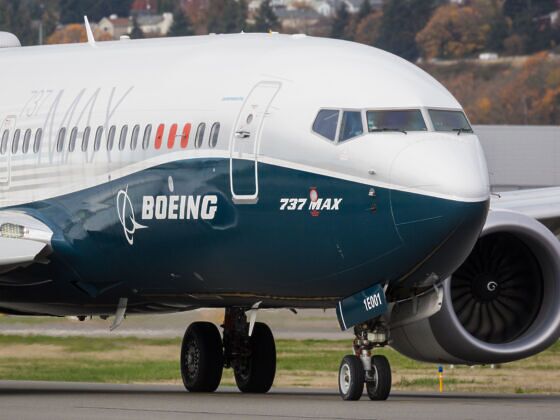Last week, American Airlines placed its largest aircraft order in more than a decade. In addition to purchasing dozens of both Airbus and Embraer planes, the airline bought 85 Boeing 737 MAX 10 jets and amended a previous order for the smaller 737 MAX 8 model, opting to add 30 more of Boeing’s newest, largest MAX planes to its fleet in their place.


In One Week, Boeing Failed FAA Safety Tests and Sold a Large Order of New MAX Planes to American Airlines
The airline’s decision to more than double its 737 MAX stock comes at a controversial time. In January, an Alaska Airlines flight was forced to make an emergency landing after a door plug blew off of a 737 MAX 9 jet during the plane’s ascent, creating a gaping hole in the aircraft. Missing bolts likely caused the blowout, federal investigators have said.
While the Department of Justice (DOJ) is conducting a criminal investigation into the incident, the Federal Aviation Administration (FAA) recently completed a six-week audit of Boeing’s 737 MAX range. The results, reported by The New York Times this week, reveal numerous problems with Boeing’s manufacturing process and quality control.
Of the 89 individual audits that the FAA conducted, 33 failed. Regulators found Boeing to be in violation of its own best practices on 97 counts. In one example, auditors witnessed mechanics at Boeing supplier Spirit AeroSystems using Dawn dish soap as a door-seal lubricant.
Spirit AeroSystems, a company that produces Boeing’s fuselages, or the main bodies of its aircraft, failed seven of its 13 audits, including one concerning door-plug installation.
These failed FAA safety tests follow a February edict from the administration to Boeing demanding a thorough plan to improve its quality-control issues. Yet incidents involving Boeing’s 737 MAX planes predate the Alaska Airlines malfunction that precipitated the FAA’s order.
In October 2018 and March 2019, two 737 MAX 8 jets crashed, killing all people on board in both cases. There were 346 total fatalities. In response, the FAA and other global aviation regulators grounded the aircraft and forced Boeing to halt production of all MAX planes.
A congressional report following an 18-month probe into the crashes determined their causes to be “the horrific culmination of a series of faulty technical assumptions by Boeing’s engineers, lack of transparency on the part of Boeing’s management, and grossly insufficient oversight by the FAA” rather than isolated mechanical issues.
In December 2020, one month after MAX planes were cleared to resume flying after a nearly two-year global hiatus, American Airlines operated the first US flight aboard a 737 MAX jet.
Problems with MAX aircraft have persisted following the Alaska Airlines incident in January as well. Ensuing inspections by both Alaska Airlines and United Airlines revealed “loose hardware” on 737 MAX 9 jets. United Airlines also had an issue with a 737 MAX 8 last month when pilots experienced malfunctioning rudder pedals, which help to control a plane’s left-right movement, during a landing at Newark Liberty International Airport. There were no injuries.
More recently, Boeing was linked to two incidents involving different planes: a 777-200 jet that saw a wheel fall off during a United flight last week, and a 787 Dreamliner that suddenly “dropped” during a domestic LATAM flight in Australia this week, leaving 50 injured.
Between public opinion, probes and audits, financial liabilities, and a steeply dropping stock price, Boeing’s takeoff into 2024 has been bumpy. While some airlines have openly considered dropping various 737 MAX jets from their fleets, and questioned the reliability of the new 737 MAX 10 model, American Airlines’ recent 115-plane order for the newest MAX model is proof that commercial aviation still relies, in part, on Boeing.
Currently, Boeing and Airbus represent the vast majority of large jetliners in the sky, operating a duopoly in the commercial aircraft space.
Of American Airlines’ recent purchase, Boeing’s President and CEO Stan Deal said in a press release, “We deeply appreciate American Airlines’ trust in Boeing and its confidence in the 737 MAX family … Our team here at Boeing is committed to delivering on this new order and supporting American’s strategic growth with one of the industry’s largest and most modern fleets.”